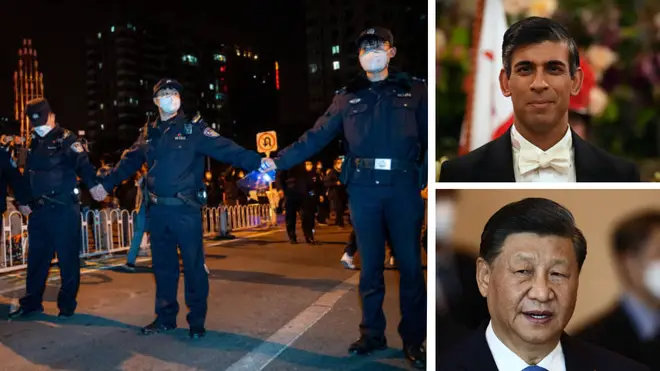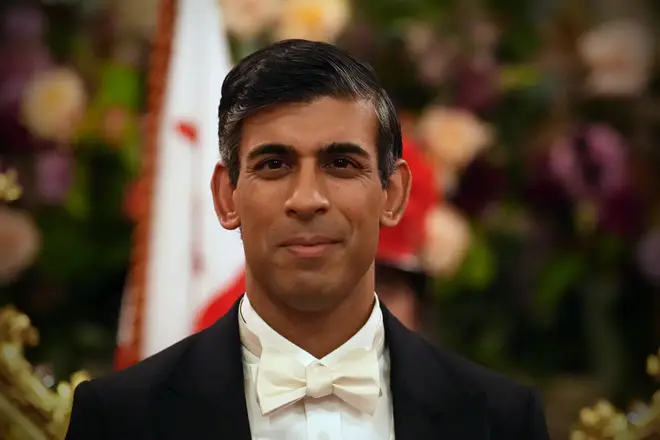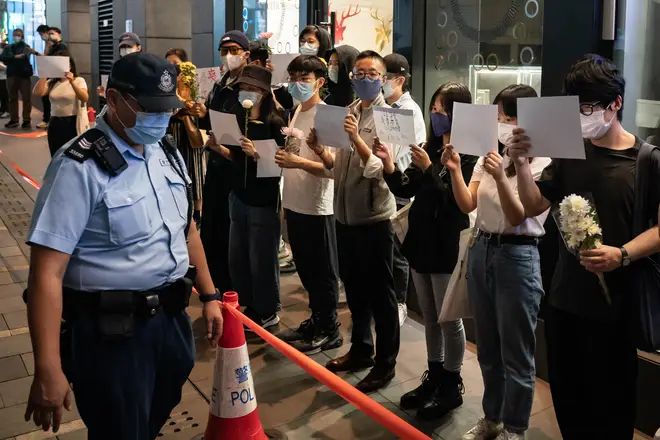
Clive Bull 1am - 4am
28 November 2022, 20:00 | Updated: 28 November 2022, 23:41

China cracked down on protests against its strict Zero Covid regime, with police launching a show of force against anti-government dissenters on Monday - as British Prime Minister Rishi Sunak warned that the "golden era" of relations between London and Beijing are over.
Chinese police came out in force across the country on Monday in a bid to quell the burgeoning protest movement, which was first sparked by a fire in Xinjiang province that killed ten people. Campaigners blame China's Covid rules for the deaths.
Authorities barricaded streets in Shanghai and lined up outside metro stations in Beijing on Monday, both locations where activists had planned protests.
Most protests have been peaceful so far, with some demonstrators calling for more free speech in the authoritarian country - and even the removal of president Xi Jinping.
But some onlookers worry that the protests could soon turn violent. Former US national security adviser John Bolton told LBC on Monday that he expected the Chinese authorities to crack down harder soon.
"You can see how prepared the Chinese government is to use repressive force by looking at what they did to Hong Kong, violating a sacred international agreement," he said.
"That’s the sort of behaviour that I think we could see if these protests continue."
Mr Sunak amped up his rhetoric on China on Monday night, saying "the naïve idea" that trade with the country would lead to social and political reform is gone.
In a speech at the Lord Mayor’s Banquet tonight, the PM seemed to signal a more aggressive approach on relations with the country, saying China is "consciously competing for global influence using all the levers of state power".
He said that faced with these challenges "short-termism or wishful thinking will not suffice. We can’t depend on Cold War arguments or approaches, or mere sentimentality about the past.
Read more: 'China protests show Xi's grip on power is becoming shakier,' says John Bolton
"So we will make an evolutionary leap in our approach."
He added this meant "standing up to our competitors, not with grand rhetoric but with robust pragmatism".

Mr Sunak said the UK government was taking a "longer-term view" on China, and was "strengthening our resilience and protecting our economic security" and openly criticised the regime's treatment of protestors.
"Let’s be clear, the so-called “golden era” is over, along with the naïve idea that trade would lead to social and political reform," he said.

"But nor should we rely on simplistic Cold War rhetoric.
"We recognise China poses a systemic challenge to our values and interests, a challenge that grows more acute as it moves towards even greater authoritarianism.
"Instead of listening to their people’s protests, the Chinese Government has chosen to crack down further, including by assaulting a BBC journalist.
He said the media and MPs must be able to address these issues without sanction, "including calling out abuses in Xinjiang – and the curtailment of freedom in Hong Kong.
Tory MP Iain Duncan Smith accused Mr Sunak's approach to China as "pretty close to appeasement".
The former Conservative leader offered stern criticism of Mr Sunak's language, telling Channel 4 News ahead of Mr Sunak;s speech that such an approach sounded like "appeasement" and that it was "kind of anything you want it to mean".
"I don't know what more you need as evidence that they now become a threat.
"We even see a BBC journalist being beaten up and dragged away from the protests, and on the very day we see all of that the Government comes out with its robust pragmatism, which I think to most people out there means kind of anything you want it to mean, and that sounds to me, like getting pretty close to appeasement.
"I just feel the road to appeasement we went through in the 1930s. If you learn any lesson at all is the more you appease dictatorships that impose authority on their people and strip away human rights, the more you drift into dangerous waters. "Be strong, engage, but be strong when you engage about what you don't approve of."

John Bolton says China is the greatest threat to the west.
Mr Sunak's comments come after Chinese police launched a show of force across the country as they tried to head off more protests against the state's rigid zero-Covid policies in one of the most extraordinary displays of civil disobedience the nation has seen for decades.
Today, Foreign Secretary James Cleverly said the Chinese state should "take notice" of protests against its Covid approach and restrictions on freedoms.
Meanwhile John Bolton told LBC's Andrew Marr on Monday that the protests show Xi Jinping's grip on power may be loosening.
The former US national security adviser asked: "Does it threaten the regime today? No. But does it indicate that [the president] may have control of the Chinese communist party but not the entire country? I think that’s the signal."